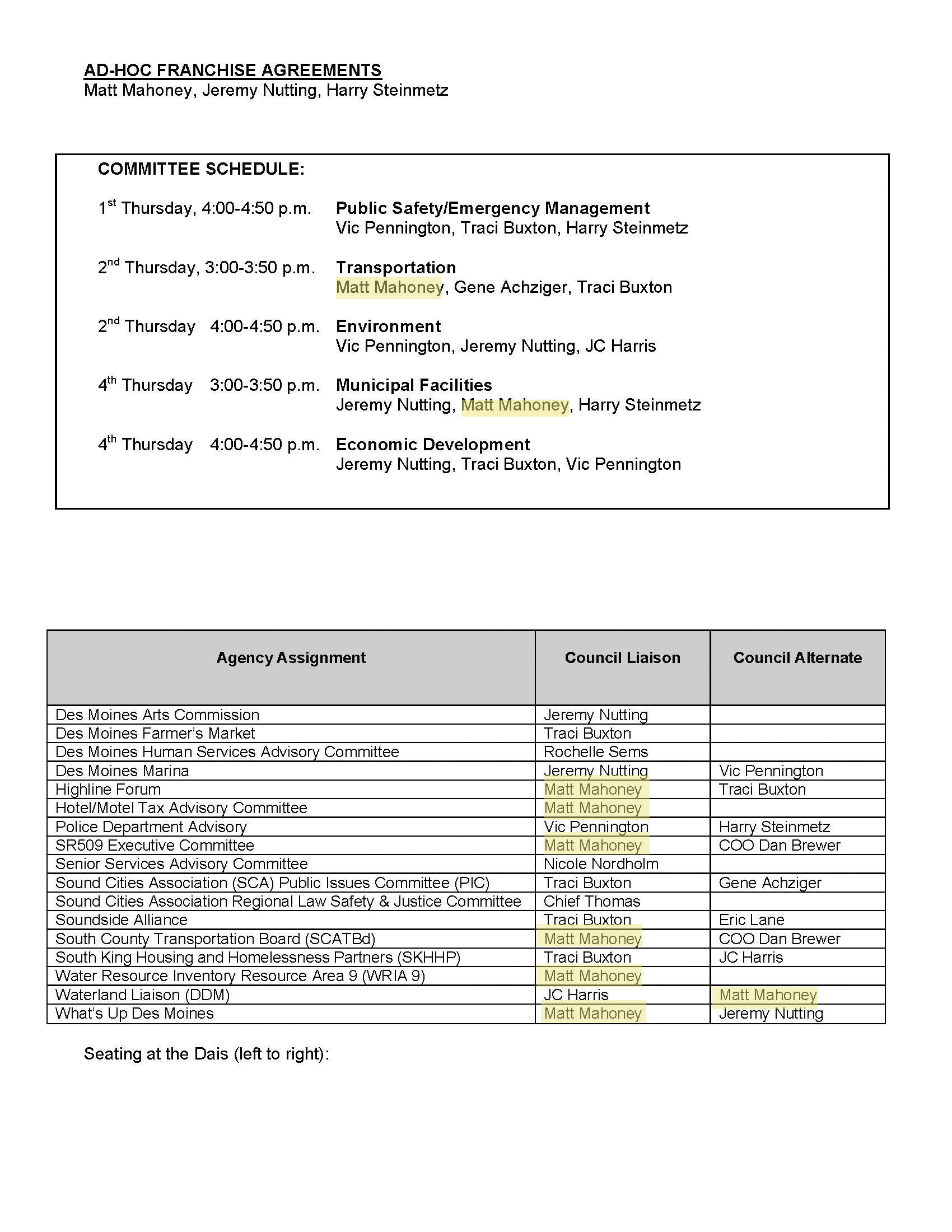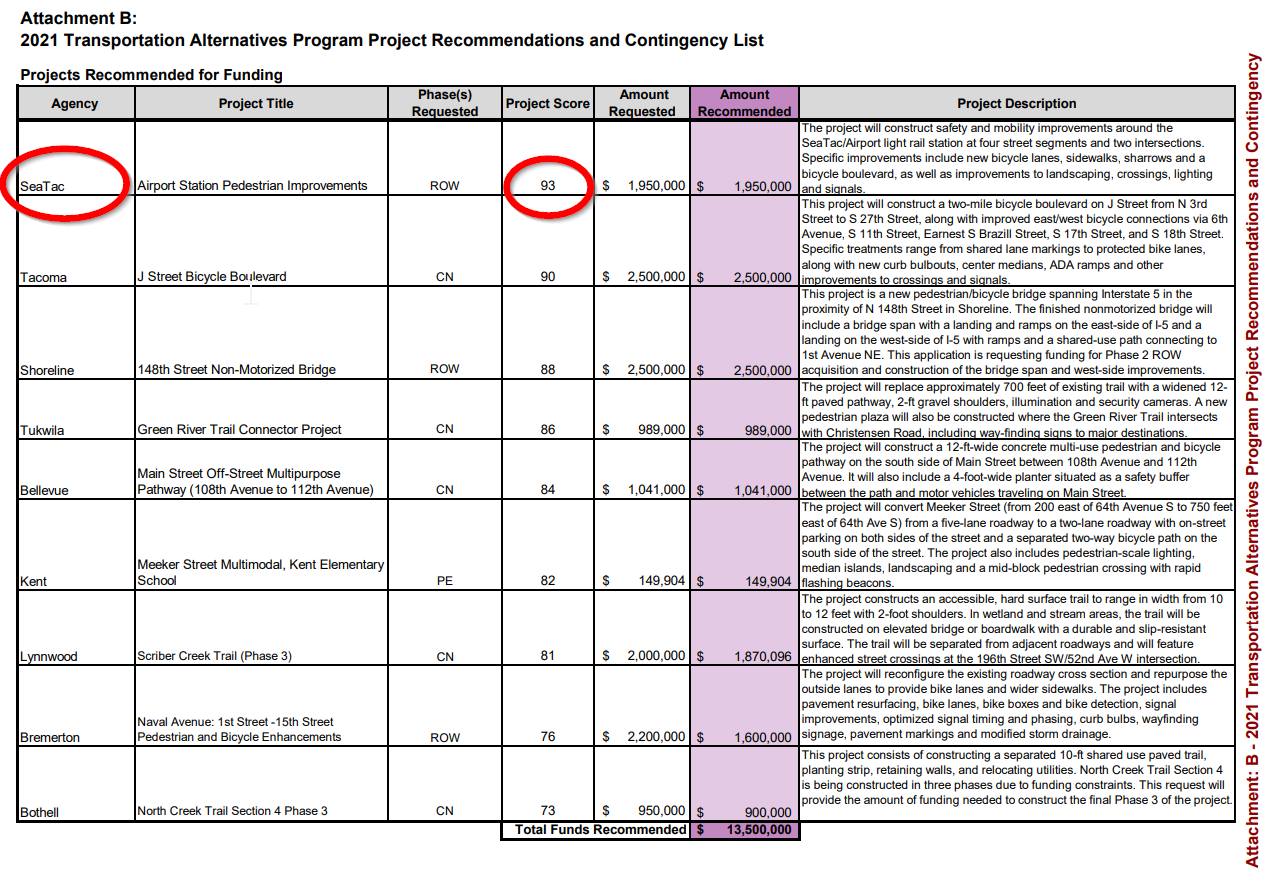Below is the list of CM Committee assignments for 2022.
The Process
In Des Moines, the Mayor is chosen by the Council at the first meeting of the year after the November General Election. Customarily, CMs send their preferences to the new Mayor and he decides committee assignments shortly thereafter. Here is my letter.
CMs do not interact with one another on this, and in fact, to do so would constitute an illegal serial meeting under OPMA. So I have no idea if some of these choices were based on my colleagues desires.
Committees are where most policy is actually decided. The City presents its ideas and the Council questions and signs off. Once that happens, it is very rare for the full Council to reject a Committee recommendation. Why should they? If you are on a Committee, you’re supposed to have studied the material in depth. You’re supposed to have developed expertise on the subject matter that the full Council does not have. For the full Council to reject an item approved by a Committee more than occasionally would mean that the Committee was not doing its job.Members of committees, both in the City and regionally, develop expertise over time. Every frickin’ thing that comes before the Council is complex. I mean everything. Why sidewalks cost $600k per block. Why Marina permits take three years. Why airplanes can’t have a curfew. Why you can build 35ft. in some places and 65ft. in others. It takes years to really learn any of this material. And then look at the regional groups where millions of dollars of grants are decided? The need to be effective is that much greater.
The Rundown
- Mayor Mahoney is the big winner with nine assignments. He assigned himself as lead on basically anything to do with transportation, the airport, hotel, and business schmoozing. He is also now the official rep to WRIA-9 (the County agency in charge of watershed restoration–eg. beaches in Lower Woodmont, Saltwater State Park, creeks, and salmon recovery.)
- Deputy Mayor Buxton remains on Economic Development. She has been the City’s lone regional rep. on various Sound Cities Association committees and has recently moved into leadership. All that makes sense. But she is also adding Public Safety which seems a bit less obvious.
- Jeremy Nutting, who also has a full time job, remains on the Economic Development Committee and Municipal Facilities Committee. He previously served as chair on both and now adds Des Moines Art Commission Liaison, Marina Advisory Commitee Liaison and “What’s Up Des Moines?” (the business schmoozing) to that portfolio.
- Vic Pennington and Harry Steinmetz have been made ‘official’ members of the Police Advisory Committee, which had been picked by the Chief in previous iterations.
- Gene Achziger’s lone assignment is to the Transportation Committee.
- There is no longer any Council presence on either the Human Services Advisory Committee or Senior Services.
- JC Harris: I wrote a letter to the Mayor after he was chosen by the Council, congratulating him and requesting assignments, it may be coincidental but…
-
- I was removed from the Transportation Committee.
- I was assigned as the primary liaison to the Waterland Festival.
- Mayor Mahoney assigned himself to WRIA-9.
- Instead of being moved to Municipal Facilities, the Mayor created a new position ‘Marina Liaison’ to the Des Moines Marina Association.
Analysis
This is the biggest shake-up in committees in memory. Typically CMs stay on committees because one builds up an inventory of experience and staff appreciate having the continuity. It’s simply more useful to have had the background on any number of projects which are discussed every year, especially given the 45 minute time limit of each meeting. Coming in cold just doesn’t make sense to me without a good reason. (I asked to be moved to MFC for specific purposes–the City web site and the Marina, both of which I have expertise.)
Because the public sees so little of what the City Council does, it’s often hard to put into sound bites, why certain topics (like committees) matter so much. But a few words come to mind: Time, Skill and above all money.
Politics
It’s reasonable to see these assignments as political choices. The Mayor put the people most aligned with the current ‘vision’ into each slot–most of all himself. This puts the lie to the notion of a ‘non-partisan City Council.’ AndHis ‘team’ wanted their people in all the key slots and was willing to go so far as to delay those assignments until April to do so.
The Council has been highly partisan for a very long time, but not along traditional Democrat/Republican lines as that word is often used.
- Mayor Mahoney has a full-time job, which he proudly states takes at least fifty (50) hours a week. And yet, the Mayor has assigned himself to nine positions, in addition to the built-in functions of the Mayor.
- Similarly, CM Nutting has a full-time job, which also requires 50+ hours a week and yet he has been assigned to six positions.CM Pennington, though retired, is coming in cold to five positions, including three committee assignments. Although I appreciate his previous experience on the Council, that’s a heavy load for an appointment, since, again, he will have no continuity on any of those spots.
In Council-Manager Government, mayors typically assign themselves a lighter committee load than their colleagues for three reasons:
-
- First, because they already have an extra job in preparing agendas and performing tasks like commitee assignments.
- Second because they have several regular meetings with various regional organisations that do not appear on this list.
- Finally, because a Council is a group body. The Mayor already has a great deal of authority so the custom is to spread the responsibilities equitably throughout the body, based on CM’s talents, interests and availability.
The only logic behind having people in so many positions or with so little time or experience is to say that these committees do not drive policy. It’s further proof that, the current majority is not merely a ‘rubber stamp’ for the Administration, it actively works to block oversight which might lead to better results.
It also further reduced the ability of the committees to provide oversight and policy direction because we will now be cramming twelve months of work into no more than nine 45 minute meetings. (Actually, it will probably be eight. Staff typically cancels one meeting during the summer. And that’s one more item on my process reform list.)
And once again, it dismisses the notion that the ‘problem’ was the last Mayor. That was unfair to him. In fact, his committee assignments were far more sensible and fair.
Money
But even if one buys the argument that our own Committees can function as rubber stamps, there are those regional organisations like SCA and AWC and PSRC, which all sound like so much blah, blah, blah to you.
The fact is, the all those are the source of millions of dollars of State and Federal funding. It is beyond irritating to watch other nearby cities obtain grants and projects that we will never see, simply because their Councils engage far more effectively.
I borrowed this from a public post made by SeaTac CM Peter Kwon from the following document. I have to take a few deep breaths every time I see already wealthy cities like SeaTac get even more grant funding because they’re Council has developed more influence on regional organisations like PSRC.
Suggested Reforms
Other cities with Council-Manager Government do not leave Committee assignments solely to the discretion of the Mayor. And this is another process reform I would make for the following reasons:
- First because it is another ‘power’ that we just gave to the Mayor over time.
- I think this is something that all CMs should be able to discuss and work out as a body.
- We not only give the Mayor the power to decide ‘who’, we give him the power to decide when. He simply decided to not begin committee work until April. And my colleagues seemed to be OK with that. This reduces the ability of these committees to provide oversight and policy direction because they will now be cramming twelve months of work into no more than nine 45 minute meetings. (Actually, it will probably be eight. Staff typically cancels one meeting during the summer. And that’s one more item on my process reform list.)
- These assignments are important to the functioning of the City and to our performance in regional settings (eg. Federal and State planning and grants.) I believe both all CMs and the public should have a transparent understanding as to how/why these assignments are made.





